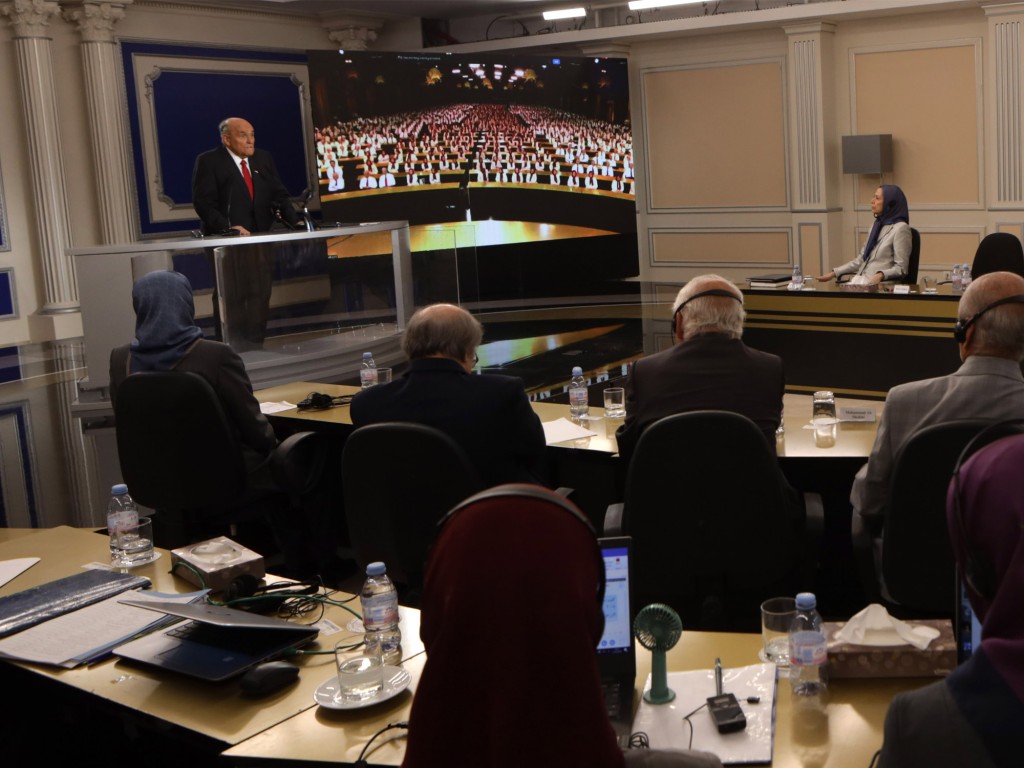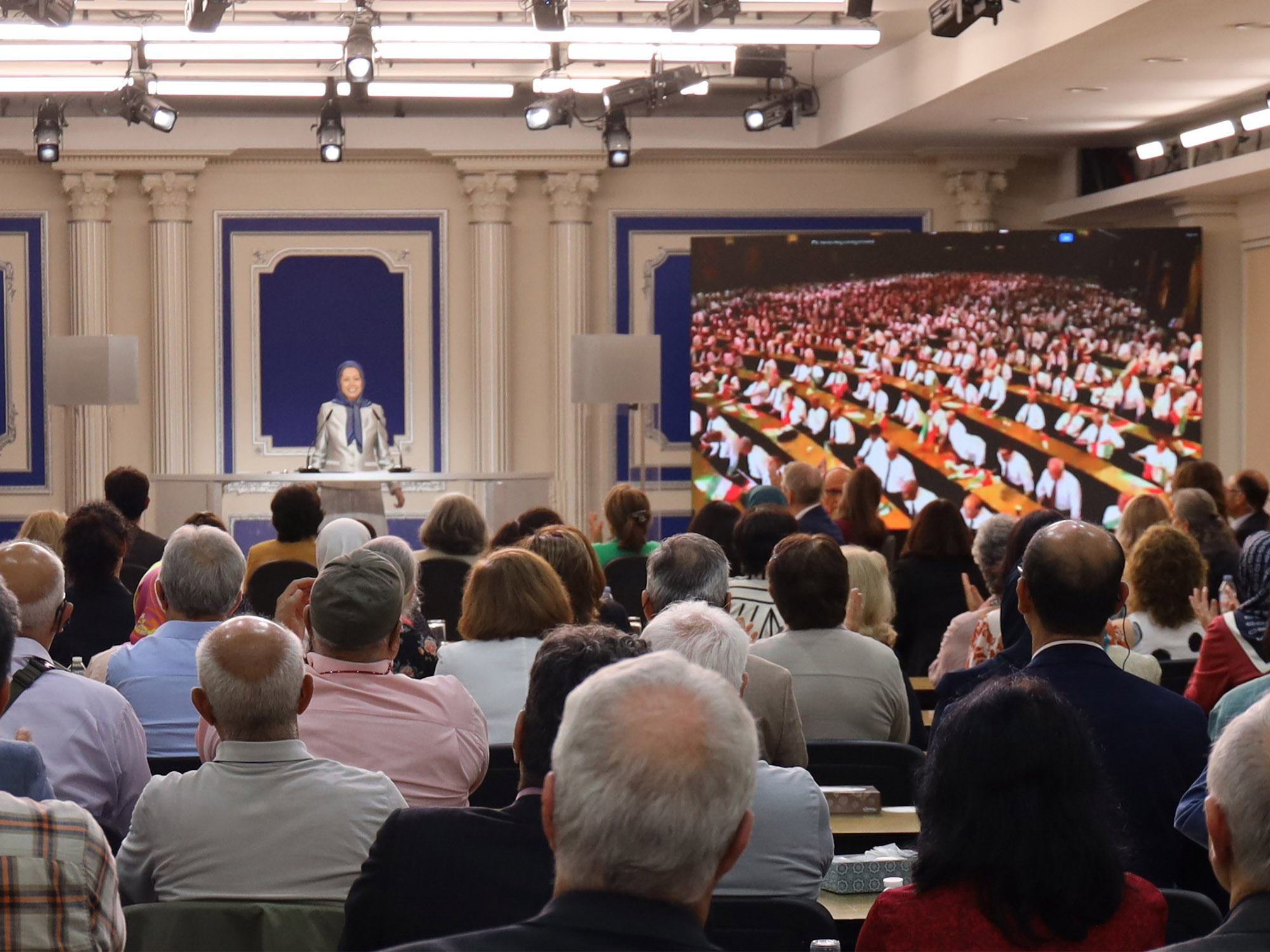Conference with Mayor Rudy Giuliani on the Anniversary of the Attack on Ashraf by Khamenei’s Puppet Government in Iraq

Maryam Rajavi: The Imperative to Change International Policy Toward the Clerical Regime
Mayor Giuliani,
Dear Dr. Ryan, Mr. Lars Rise,
Dear friends!
I am pleased to welcome you today to the home of the Iranian Resistance.
The name of the MEK resonates with the struggle for freedom and Iran’s liberation from the Shah and the mullahs, in contemporary history. For this reason, they have always been the target of massacres and repression. The issue is that the Velayat-e Faqih regime (religious dictatorship) must go, and freedom, democracy, and equality must be established in Iran.
Remembering the Martyrs of the Attack on Ashraf on July 28 and 29, 2009
Today, marks the 15th anniversary of the attack by Khamenei’s puppet government in Iraq and the massacre of Ashraf residents. That attack took place right amid the 2009 uprisings. Khamenei wanted to extinguish the light that inspired Iran’s rebellious youth.
We will never forget those dear martyrs: Amir Khairi, Hanif Emami, Mehrdad Niksiyar, Siavash Nezamolmolki, Alireza Ahmadkhah, Hamid Zamani, Mehrdad Rezazadeh, Mohammadreza Bakhtiari, Hossein Mahmoudi, Shaban Suri, Hamdollah Rahmani, Asghar Yaghoubpour, and Mohammad Tataie.
Tributes to all of them. Over those two days, more than 500 individuals were injured, and 36 were taken hostage, making a profound global impact with their 72-day hunger strike.
And we will never forget the stance of Mayor Giuliani and his friends who protested the massacre of Ashraf residents on that day. I remember how Mayor Giuliani was upset and distressed when he saw the scene of the U.S. forces leaving Ashraf and handing it over to Maleki’s criminals. He repeatedly admonished and criticized the U.S. government for neglecting its responsibility to protect Ashraf.
He repeatedly cried out, “Shame! Shame on this appeasement of the mullahs’ criminal regime!”
Yes, in the years when the MEK were in Iraq, Mayor Giuliani condemned the attacks and the manslaughter by forces of Nouri Maleki and underlined the need to protect Ashraf residents.
I have also witnessed some unforgettable scenes, when he confronted Martin Kobler, the UN representative in Iraq, when he spoke outside the UN, and when he spoke here along with other distinguished dignitaries.
He valiantly opposed the terrorist designation imposed upon this movement, and, amidst a global climate of appeasement towards religious fascism, he resolutely championed the Iranian people’s call for the regime’s overthrow and the establishment of freedom and democracy.
The Iranian people and protesters deeply appreciate these supports and stances against the tyrannical mullah regime. The message from the Iranian people and their allies is unequivocal: the era of religious dictatorship in Iran has come to an end. The time when this decaying regime could prolong its survival through waging wars in the Middle East and sacrificing tens of thousands of innocent lives is over. The conditions that once allowed the regime to evade the inevitable uprising and overthrow—through daily executions, the oppression of women, and acts of criminality and looting—are now a thing of the past.
Today’s Defining Reality in Iranian Society
The mullahs’ theocratic regime sees its survival in great jeopardy. Therefore, they have appointed a new president in a desperate bid to stall the uprisings through deception. Yet, the regime’s internal and external conditions are so bleak that Iranian society has little tolerance left for the pretense of reforms, and reformists themselves have no strength left.
The sweeping and unprecedented boycott of the regime’s sham parliamentary and presidential elections has underscored a crucial truth about contemporary Iranian society: the populace unequivocally demands the regime’s overthrow in its entirety. By participating in this boycott, nearly 90% of the people have voiced their rejection of the entire clerical regime.
This reality is so unyielding that Khamenei was compelled to acknowledge it for the first time. Moreover, the Speaker of the regime’s Parliament remarked that the non-participation of “a significant portion of the people” in the elections represents “a profound reality.” He further noted that “the repercussions for both the ruling system and the overall fate of society are so substantial that they cannot be easily dismissed.”
Yes, the only viable solution to Iran’s crisis is the overthrow of the current regime by the Iranian people and the Iranian Resistance. The Resistance Units and the rebellious youth, through their escalating activities across the nation, are striving to realize the Iranian people’s aspiration for regime change and the establishment of a democratic republic.
That is why the regime has orchestrated sham trials targeting the MEK and members of the Iranian Resistance, employing propaganda, threats, and intimidation to dissuade the younger generation from aligning with the MEK.
Recently, in a reaction to the Free Iran World Summit, this so-called court has threatened to prosecute and extradite participants in the Resistance’s protests and gatherings, even from thousands of kilometers away from Iran.
Yet, these oppressive tactics only serve to galvanize support for the MEK and the Iranian Resistance, with more individuals joining their cause in defiance of the regime’s efforts.
The Message of the Decisive Boycott of the Regime’s Sham Elections
The regime’s new president does not miss any opportunity to declare his commitment to implementing Khamenei’s policies, asserting that he has no agenda beyond the Supreme Leader’s directives.
He extols Khamenei’s policies and positions, which are widely despised by the Iranian people, as “the insight of our leader.” He lauds Ebrahim Raisi, the henchman of the 1988 massacre, as a “deeply devoted and respected servant,” and repeatedly venerates Qassem Soleimani as a hero, despite his role as the murderer of MEK members in Ashraf and the butcher of people in the region. However, his most telling remark, which underscores the true state of the regime, is his statement: “I came because I saw the regime in danger.”
The Iranian people have disregarded the change in leadership, viewing it as merely a change of faces—two sides of the same coin. The message of their decisive boycott of the mullahs’ sham election was also clear that their vote is to overthrow the regime.
Predictably, some lobbyists, who are regular recipients of the regime’s patronage, will support whoever assumes power, whether it be the henchman of the 1988 massacre or even figures as notorious as Genghis Khan. Their consistent conclusion remains that the only viable approach is to continue offering concessions to the regime.

The Appeasement Policy Sustains the Regime’s Warmongering and Terrorism
While the ruling mullahs face growing resistance from the Iranian people and are under the pressure of the activities of the Resistance Units, the regime continues to exploit the policy of appeasement to stave off the threat of its overthrow. This policy operates in several crucial areas:
Firstly, it seeks to suppress and curtail the resistance of the Iranian people.
Secondly, under the guise of appeasement, the mullahs have been afforded unchecked latitude to incite and exacerbate regional conflicts with impunity.
Thirdly, this policy has enabled the regime to leverage the markets of Western countries, their media platforms, and even their government circles to advance its aggressive and repressive agendas.
The regime’s terrorist operatives are active across Europe, including in Germany, the United Kingdom, the Netherlands, France, and other countries, and their activities have even extended to the United States.
We observed that the German government, after considerable delay, was eventually compelled to close 53 of the regime’s terrorist centers within its borders. However, the primary terrorist hubs for the regime remain its embassies in various countries.
It is important to note that as long as these governments maintain their current policies and fail to support the Iranian people in their efforts to overthrow the regime, they will remain vulnerable to the regime’s terrorism, hostage-taking, and other criminal activities. Without a shift in policy, they will lack a reliable defense against these threats.
This fundamental principle is equally applicable to the current regional crisis. The regime’s inflammatory actions in the Middle East and its concerted efforts to destabilize the region can only be resolved through the regime’s overthrow by the Iranian people and the Iranian Resistance.
The Implications of the Policy of Appeasement
When discussing appeasement, the key factor is turning a blind eye to the gross violations of human rights in Iran and, more importantly, being complicit in suppressing the resistance movement, which benefits the regime.
The establishment of the National Liberation Army, born from immense sacrifices and suffering of the Iranian people, was a patriotic and popular response—a decisive answer to the equation of overthrowing the Velayat-e Faqih regime.
The U.S. decision to bomb and collect the weapons of this army, at the behest of the mullahs, represents the most significant mistake in its policy toward Iran.
The designation of the MEK as a terrorist organization, coupled with the United States’ breach of its agreement to protect the residents of Ashraf, gave a free hand to the terrorist Quds Force and Khamenei’s puppet government in Iraq. This led to ruthless attacks on Ashraf and Liberty and represents one of the gravest wrongs committed by U.S. appeasement policy, which shifted the regional balance in favor of religious fascism.
Let us not forget that at the height of the 2022 uprising, the U.S. government was secretly negotiating with the government of Ebrahim Raisi, the mass murderer. Again, precisely on the anniversary of that uprising, an agreement was reached with the mullahs involving a prisoner swap and the provision of funds to support religious fascism. The consequences of this agreement soon became evident.
First came the regime’s warmongering in Gaza, followed by over 200 attacks by IRGC forces—its proxy forces—on U.S. personnel in Iraq and Syria. This was accompanied by attacks from Khamenei’s Houthis in the Red Sea, among other ongoing conflicts. The regime was emboldened to carry out these assaults, not due to its own strength but because of appeasement.
Without the political shelter provided by appeasement over the past several decades, Khamenei would not dare to fire a single bullet. All this warmongering is a desperate attempt by Khamenei to deflect attention from the uprisings within Iran. Therefore, the effects of appeasement are felt most acutely by the people and their uprising in Iran.
However, just as the Shah’s dictatorship could not escape the uprising and overthrow despite extensive support from Western governments, the mullahs’ dictatorship, despite all Western incentives and concessions, will similarly be unable to avoid the inevitable uprising and eventual overthrow.
Fortunately, there is now a burgeoning international movement in support of the Iranian people and their Resistance. This is evidenced by statements from 4,000 parliamentarians, including the majority of representatives from 34 parliaments around the globe, as well as endorsements from 137 former heads of state, prime ministers, ministers, ambassadors, and leaders of international organizations, all backing the Iranian Resistance’s 10-Point Plan. We urge the world to support this solution.

